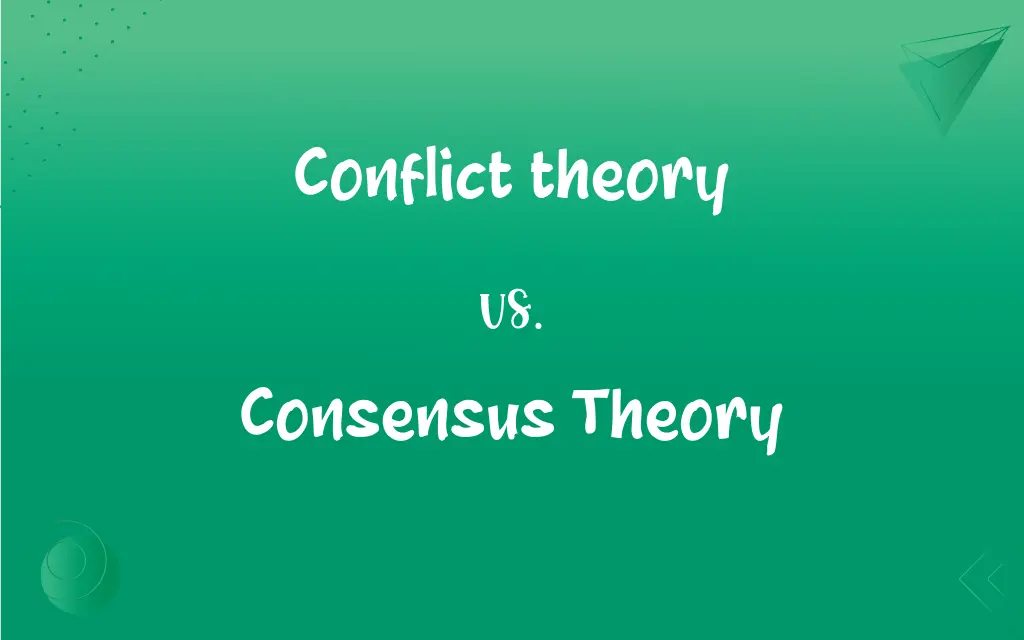Conflict Theory vs. Consensus Theory: What's the Difference?
Edited by Aimie Carlson || By Harlon Moss || Updated on October 12, 2023
Conflict theory emphasizes social inequality and power disparities, while consensus theory focuses on societal unity and shared norms and values.

Key Differences
Conflict theory pivots on the notion that societies are grounded in social inequalities, perpetuating varying forms of conflict. The theory insists that the underlying disparities in power and resources are focal points for understanding societal structures and behaviors. While examining society, conflict theory underscores the perpetual clashes of interest among social groups and deems them inevitable and pivotal for social evolution.
In the contrasting light, consensus theory embodies the belief that societal harmony is attainable through shared values and common norms. The crux of consensus theory lies in the collective norms and values which bind individuals, asserting that these shared aspects form the bedrock for societal order and unity. Societies, from this viewpoint, generally work cooperatively to achieve mutual benefits and order, stemming from a collective agreement upon social norms and values.
While conflict theory primarily underlines social divisions and disparities, it concurrently sheds light on how these social conflicts pave the way for social change and evolution. The perpetuation and emergence of conflicts are seen as inherent mechanisms through which societies undergo transformation and adapt to shifting paradigms. Thus, conflict theory does not merely highlight disputes but underscores them as catalysts for social shifts and changes.
On the other hand, consensus theory tends to be optimistic regarding societal structures and interactions, accentuating the integration and stability aspects of society. While it acknowledges the existence of societal conflicts and disruptions, consensus theory primarily posits that common values and norms are predominant, fostering societal stability and harmony. It suggests that social order is maintained when members of society generally agree upon what is socially acceptable.
It's notable that while conflict theory often provides a macroscopic, class-based analysis of societal structures, consensus theory provides a more microscopic, individual-based perspective. Conflict theory frequently highlights broad, systemic issues, interpreting social phenomena within the context of these larger conflicts. Conversely, consensus theory often navigates through the societal fabric by exploring the mutual agreements and collective conscience of individuals and groups within the society.
ADVERTISEMENT
Comparison Chart
Basic Premise
Society is shaped by conflicts and disparities.
Society is formed through shared norms and values.
View on Society
Society is often in a state of contention.
Society is generally in a state of harmony.
Agents of Change
Social conflicts and disparities.
Shared norms and collaborative solutions.
Focus of Study
Macroscopic, often class-based analysis.
Microscopic, often individual-based analysis.
Example Theorist
Karl Marx
Émile Durkheim
ADVERTISEMENT
Conflict Theory and Consensus Theory Definitions
Conflict theory
Conflict theory explores the social inequalities and disputes that arise due to disparities in power and resources.
The scholar utilized conflict theory to dissect the ongoing power struggles between varying socio-economic classes.
Consensus Theory
Consensus theory asserts that societal conflicts are minimal when shared norms are prevalent and dominant.
Consensus theory elucidated how a shared belief in democracy mitigated potential conflicts within the nation.
Conflict theory
Conflict theory posits that societal conflicts, often stemming from inequalities, are inevitable and crucial for social change.
Conflict theory was invoked to analyze the social protests as potential catalysts for transformative societal change.
Consensus Theory
Consensus theory believes in the existence of a general agreement in societies that forms the basis for collective actions and societal norms.
Through the prism of consensus theory, the unanimous voting decision was perceived as a reflection of societal harmony.
Conflict theory
Conflict theory suggests that social order is often maintained through domination and power rather than consensus and agreement.
Employing conflict theory, the researchers examined how societal stability was often upheld through coercive power structures.
Consensus Theory
Consensus theory emphasizes the societal integration achieved through shared norms and values.
According to consensus theory, societies remain cohesive due to widely accepted and practiced cultural norms.
Conflict theory
Conflict theory often frames societal structures and relations as being shaped by overarching systems of power and control.
Through the lens of conflict theory, the political upheaval was examined as a manifestation of underlying class warfare.
Consensus Theory
Consensus theory posits that social order is maintained when society agrees upon laws and norms.
Consensus theory was used to explain the peaceful coexistence within the culturally diverse society.
Conflict theory
Conflict theory predominantly investigates the mechanisms through which power and resources are distributed and contested in society.
Conflict theory highlighted the stark disparities in wealth distribution and the resultant social tensions.
Consensus Theory
Consensus theory underscores that collective conscience and common values are pivotal for societal harmony.
The researchers, adhering to consensus theory, attributed the nation’s stability to its shared beliefs and moral values.
FAQs
Does conflict theory perceive social conflict negatively?
Not necessarily; it views social conflict as a catalyst for necessary social change and development.
What is the main focus of consensus theory?
Consensus theory emphasizes societal harmony, stability, and shared norms and values.
How does consensus theory view social order?
It views social order as a product of societal agreement on norms, values, and laws.
Can consensus theory and conflict theory be applied simultaneously?
Yes, they can be used complementarily to provide a comprehensive view of society.
What does consensus theory say about cultural diversity?
It posits that harmony can exist amidst diversity if shared norms are established.
Who is a notable theorist associated with conflict theory?
Karl Marx is widely recognized in relation to conflict theory.
Does consensus theory ignore social conflicts?
Not ignore, but it posits that shared norms and values outweigh conflicts in maintaining social order.
How does conflict theory interpret laws and social norms?
It often views them as tools used by dominant groups to maintain power and control.
How does conflict theory explain wealth disparities?
It highlights how power structures and capitalism perpetuate inequalities.
Can conflict theory explain social stability?
Yes, by illustrating how power structures manage to suppress or mitigate conflicts.
Is conflict theory more macro or micro-oriented?
Conflict theory generally adopts a macro-oriented approach, focusing on large-scale social structures.
How does consensus theory view deviance?
It generally perceives deviance as a result of insufficient socialization into shared norms.
Is consensus theory predominantly micro-level in its analysis?
Generally, yes, it often focuses on individual and small group dynamics within society.
Which theory is more positive about societal structures and interactions?
Consensus theory tends to have a more optimistic view of societal structures and interactions.
Is conflict theory deterministic?
No, while it emphasizes structural factors, it doesn’t negate the role of individual agency.
What is a criticism of consensus theory?
It’s often critiqued for oversimplifying and idealizing social harmony and agreement.
What is the main premise of conflict theory?
Conflict theory focuses on social inequalities and sees conflict as a driver of social change.
Is Emile Durkheim associated with consensus theory?
Yes, Durkheim’s work emphasizes collective conscience, aligning with consensus theory.
Can consensus theory explain social change?
Yes, it can, by exploring shifts and adaptations in shared values and norms.
Can conflict theory be applied to analyze global relations?
Yes, it is often used to explore power dynamics and conflicts at the international level.
About Author
Written by
Harlon MossHarlon is a seasoned quality moderator and accomplished content writer for Difference Wiki. An alumnus of the prestigious University of California, he earned his degree in Computer Science. Leveraging his academic background, Harlon brings a meticulous and informed perspective to his work, ensuring content accuracy and excellence.
Edited by
Aimie CarlsonAimie Carlson, holding a master's degree in English literature, is a fervent English language enthusiast. She lends her writing talents to Difference Wiki, a prominent website that specializes in comparisons, offering readers insightful analyses that both captivate and inform.































































